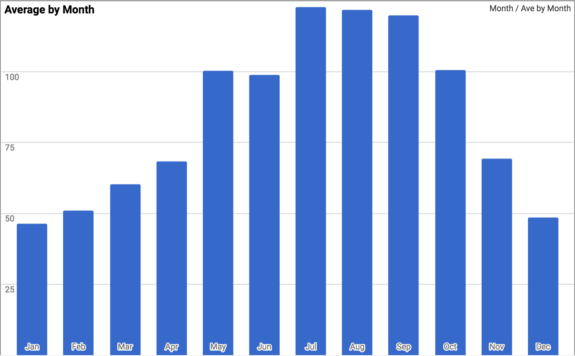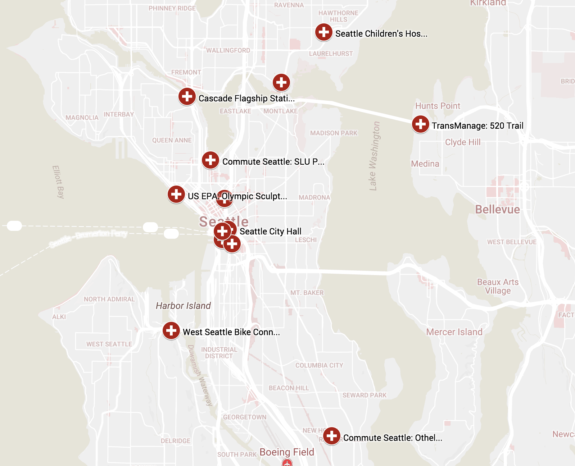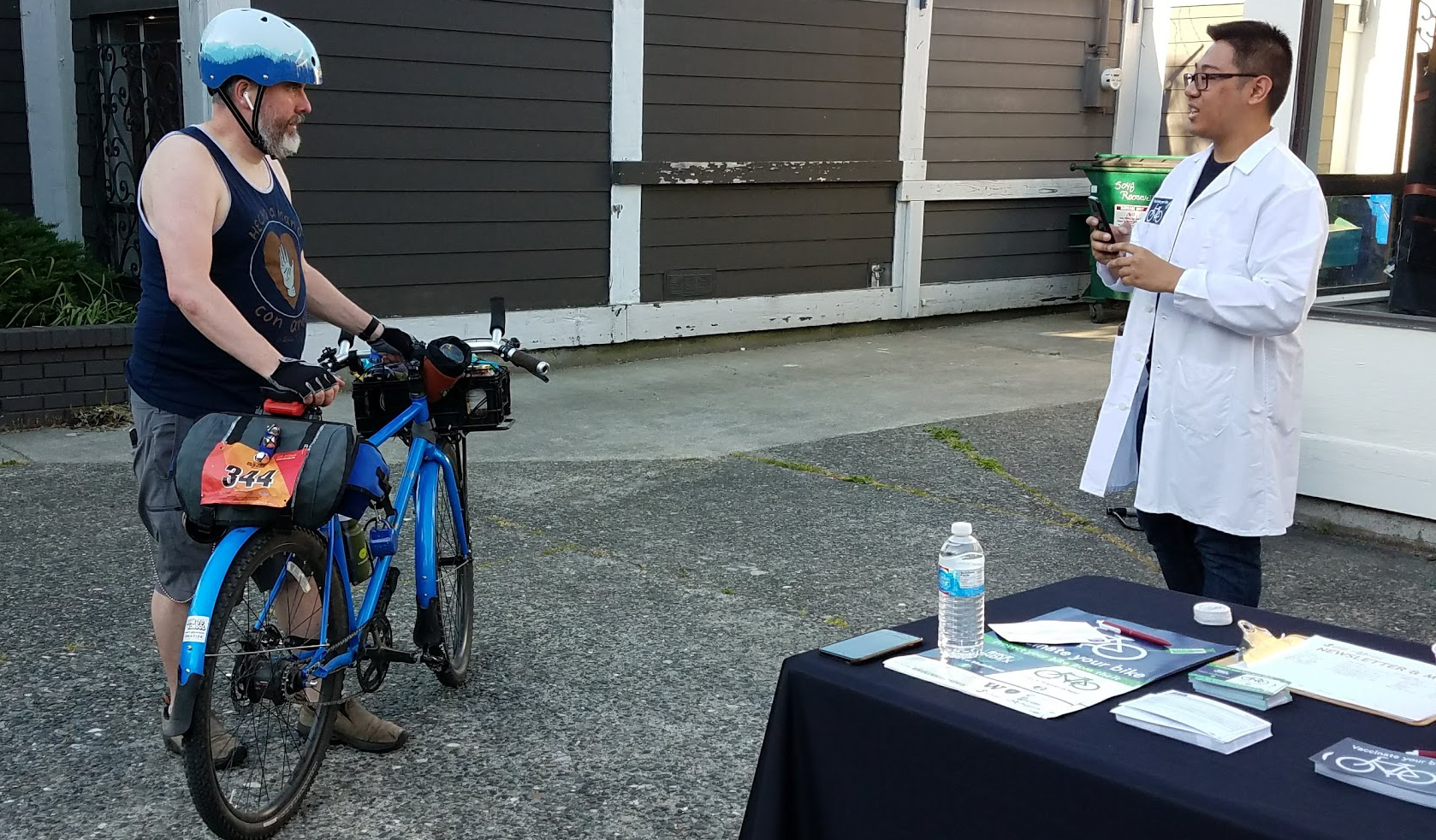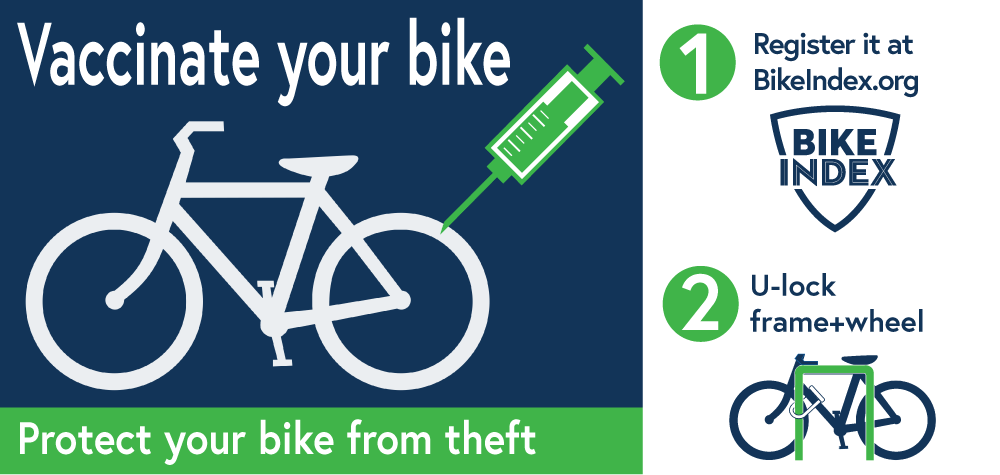Editor’s Note: This is a guest post by Brock Howell of Bicycle Security Advisors. The group is launching a campaign to fight bike theft by getting more people to register their bikes online with Bike Index.
Bike theft is a major problem in Seattle — and I didn’t have to write this sentence for you to know it. That’s why there’s now a campaign to vaccinate bikes this month, and volunteers will be at fourteen Celebration Stations on Friday morning to register bikes.
Every year, more than a 1,000 bikes are reported as stolen to the Seattle Police Department. Far worse, based on federal crime reports, the number of bikes actually stolen is likely five to six times what is reported to the police. With seven percent of people never replacing their stolen bike again, this is a real issue for increasing the number of people who bike.
From May to October, Seattle experiences epidemic levels of bike theft.

This isn’t too surprising. These are the months that people are biking and so their bikes are more vulnerable to theft.
It’s a little like how people are more susceptible to the influenza virus in the winter because their immune systems are weakened by the weather. Which brings us to how we can attack our seasonal bike theft epidemic.
Bike theft doesn’t have to reach epidemic levels every year. As the founder of Bicycle Security Advisors, I’ve been working with councilmembers, transportation agencies, police departments, developers, and businesses to improve bike parking and fight bike theft through better land use codes, neighborhood planning, direct consultations, and better police resource deployment.
Here’s what you can do: vaccinate your bike.
Vaccinate your bike?
Yes. Like how every October-November the Center for Disease Control coordinates a public education campaign to encourage people to get their flu shot, I am coordinating a public education for people to register their bikes and to properly lock them up.
If you ever have your bike stolen, you will need photos, a detailed description, and your bike’s serial number to get it back, as well as a community of people who are looking out for your bike. That’s what the bike registration sites Bike Index and Project 529 Garage provide. They’re free, independent, and easy to use.
Tomorrow morning at fourteen Bike Everywhere Day Celebration Stations, a fleet of volunteers wearing white doctors’ coats will be out registering bikes in person on Bike Index. It’s the perfect time for you to get your bike signed up, and it’ll take just 30 to 60 seconds of your morning.
Bike Index is fantastic. Again, it’s free, independent, and simple to use. Better yet, there are hundreds to thousands of passionate community members who are part of Facebook groups (Seattle, PNW), and Twitter conversations who actively use Bike Index to help you track down stolen bikes. Bike Index is also the official registration system of the University of Washington and the Seattle Bike Blog, and nearly every Seattle bike shop uses Bike Index to check suspect bikes to see if they’re stolen and either registers every sold bike on Bike Index or promotes it to its customers.
Plus, every bike registered and reported as stolen on Bike Index also automatically gets listed on Project 529. So, by registering on Bike Index, your bike gets listed on both sites.
Last year, the King County Sheriff’s Office BEEs (the bike & transit patrol), calculated how effective Bike Index was at helping return stolen bikes. KCSO found that nearly 70 percent of the bikes successfully returned to their owners was with the help of Bike Index. Since Bike Index started in 2014, they’ve helped return nearly 4,600 bikes to their owners.
If we register enough bikes, I firmly believe we can make it virtually impossible for a bike thief to get away with stealing bikes. Let’s achieve herd immunity.
On your way into work tomorrow, stop for 30 to 60 seconds at one of the fourteen Celebration Stations that we’ll be at and we’ll register your bike for you.

If you miss us tomorrow, we’ll also be at the Bike Month Party at Peddler Brewing tomorrow night, at the Mighty-O Tour de Donut Ride on Saturday, and at Bicycle Sunday.
Look for us in our doctors’ coats.

And you can always register your bike yourself.
A special thanks goes to all our partners and allies on this public education campaign for bike registration, including the Phinney Neighborhood Association; U District, Let’s Go; Bike Works; Cascade Bicycle Club; Commute Seattle; Seattle Department of Transportation; Seattle Neighborhood Greenways; TransManage; UW Police; UW Transportation Services; Washington Bikes; many bike shops and many others.
If you would like to contact Brock Howell about the bike registration effort, email him at [email protected].









Comments
4 responses to “Howell: Vaccinate your bike”
I’m a bike business owner in southern Washington. Most of my business is repair and custom wheel building–few accessory sales. I have worked at accessory-heavy shops in the past and have to scratch my head over the crazy, stupid habit of bike stores still in 2018 with our high bike theft (I’m near Portland, OR) insist on selling cheap locks that can be easily broken. Nothing is perfect–I’ve had to cut U-locks for customers and it’s not rocket science or playing the Emperor Concerto, it ain’t as hard as you’d think! But why do shops keep selling locks that they know are close to no protection? We don’t sell leather hairnet helmets anymore–why do we keep selling shit locks? Shops should consider an embargo on the sale of the flimsiest locks.
I sometimes like to have a very small and light lock to lock up my road bike when I’m dashing into a minimart. I of course have a Ulock for most locking applications.
I love bike index! Hate to be too pedantic but I’m gonna do it anyway. The reason influenza and cold rates go up in the winter is human proximity to each other, more people are indoors so more viruses spread! Temperature in this case doesn’t weaken the immune system.
Dang it! I was nervous I got that wrong. Your explanation for the seasonal flu is actually a way better analogy for explaining why bike theft goes up! Thanks for the correction. However, it appears we may be both wrong. A recent study shows that it’s that the virus is transmitted more easily in cold, dry air.